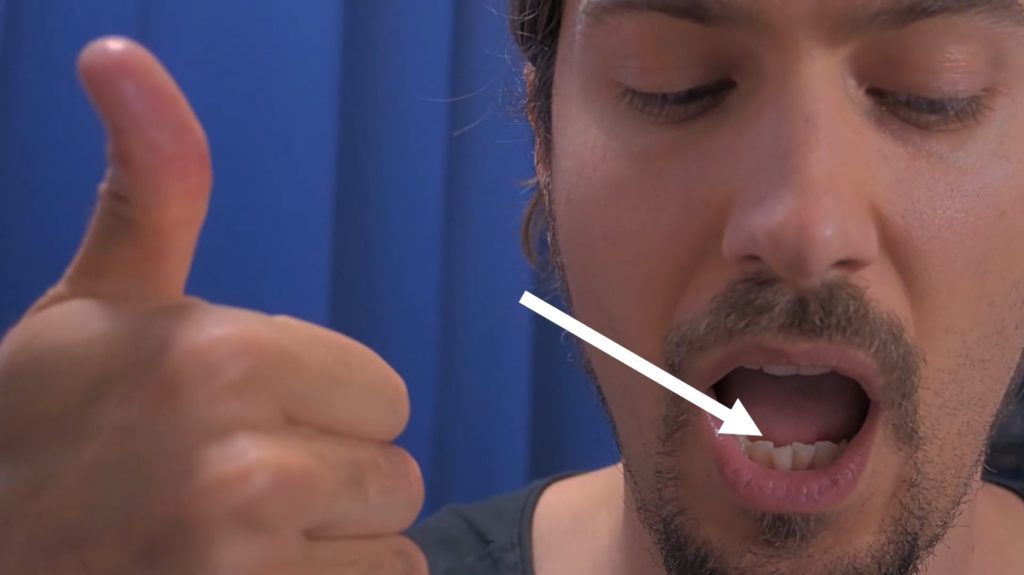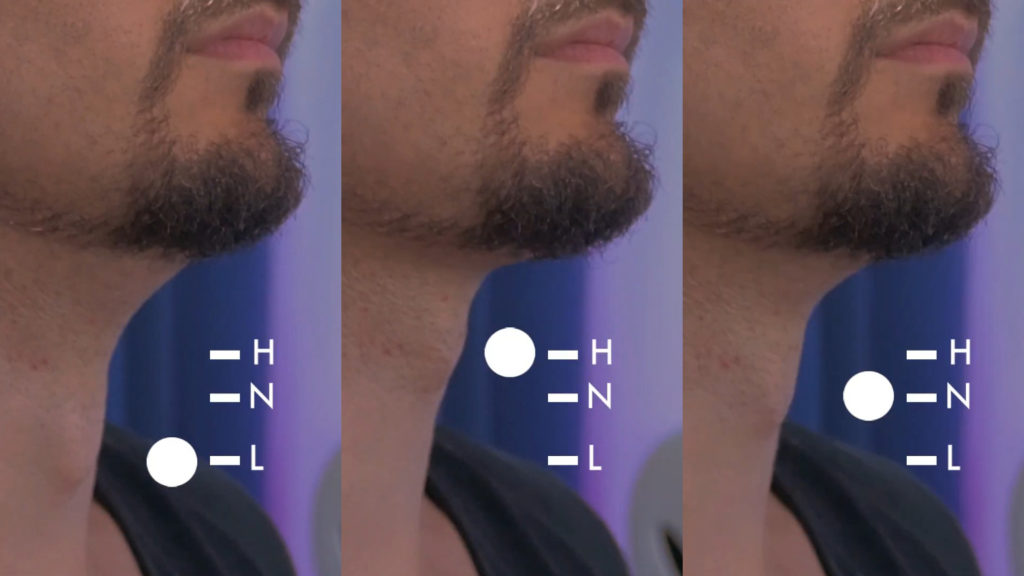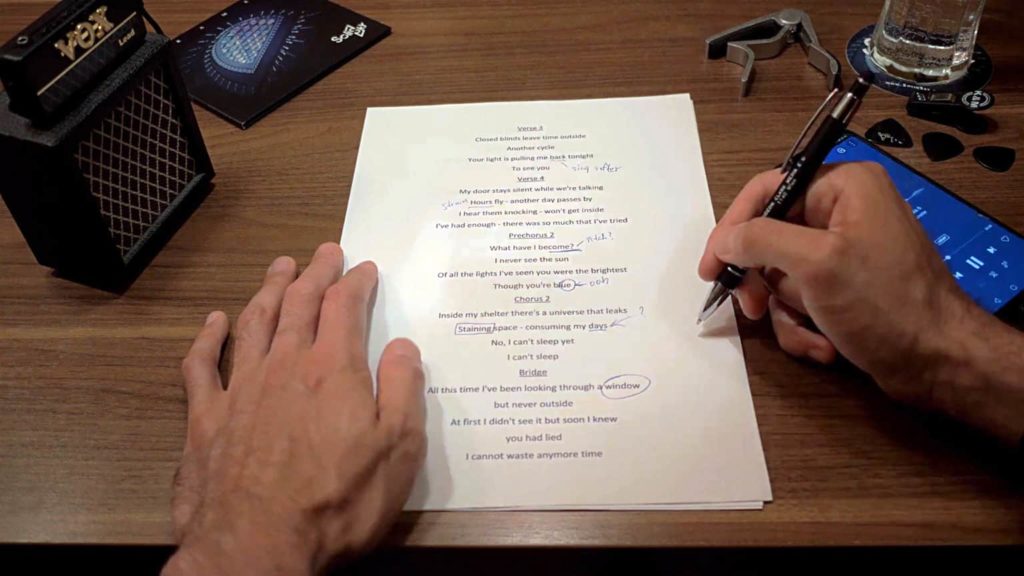5 Tips
To Instantly
Improve Your Singing
Nr. 1 - BREATHE LESS
This is a common mistake I see all the time in new students.
You think you need to take a full breath for singing – NO, you don’t!
If you breathe in too much you end up with overpressure which puts stress on your body and vocal cords.
Instead only take an 80%-breath while keeping your shoulders and belly relaxed.

You don’t have to do much. Just open your mouth and let the air in with a gentle gasp.
That’s more than enough air to sing even longer phrases.
If you feel like you’re running out of air it’s most likely because you either force the air out, or your vocal cords aren’t closing properly – NOT because you don’t take enough air in.
So relax your breathing and your singing will improve greatly.
Nr. 2 - THE TONGUE
Don’t let your tongue do what it wants. If your tongue has a mind of its own don’t let it get in the way of good singing.
Be aware of your tongue position when you practice to sing a song. If it moves to the back of your mouth or gets really tense this can cause a lot of problems.
So make sure that your tongue is relaxed and that the tip of the tongue lightly touches your bottom front teeth most of the time.

The tongue has to be able to move freely for articulation.
To train your tongue to relax do this exercise called tongue trill.
Place your tongue on your hard palate (the “ceiling” of your mouth) and make a sound. Maintain the airflow of that note, which should make your tongue rapidly move away and back to the roof of your mouth, kind of like a spanish rolled “r”-sound.
If you got a hard time getting your tongue to trill, try to start it with the letter “d” Like if you are saying “drrrr” with a rolled “r”.
If the tongue trill doesn’t work for you, you can try the following exercise:
“Ya-la-la-la-la-la-la-la-la”
This exercise starts with the “Ya”-sound which brings your tongue in a good position and continues with repetitive “La”-sounds that should feel pretty relaxed and free of unnecessary tension.
You can use this exercises on any scales you like, the focus is on keeping the tongue flexible.
Nr. 3 - THE JAW
Another thing you should be aware of is your jaw. If your jaw is tense or locked in one position this can be an issue.
Your jaw should remain relaxed and be able to move freely while singing just like the tongue should.
Instead of opening your jaw, think of it as dropping your jaw.
Here are two exercises to get you started:
Open and close your jaw gently and check for tension. Is it moving loosly or under constant tension?

Once you can do that, try to add sound to that loose movement: “Ya-ya-ya-ya-ya-ya-ya-ya-ya”
Practice infront of a mirror to make sure your jaw is moving freely from ee to ah.
If you practice this correctly your jaw will become much freer and so will your sound.
Nr. 4 - LARYNX
For great singing you need to have some awareness and control over your larynx.
Your larynx can be in a low position which makes you sound darker, in a high position which makes you sound brighter or in a neutral position which is probably closest to your speaking voice sound.
To achieve a low larynx position think of sobbing.
For a high larynx imitate the voice of a child.
For a neutral larynx speak in your normal voice.

It’s important that you don’t force your larynx in either direction.
You can raise or lower your larynx to achieve a certain sound, but it needs to be done in a careful and flexible way, never by brute force.
Record your singing and listen to the recording. Does it sound darker or brighter than your speaking voice? Maybe your sound changes when you go up or down in pitch?
Your larynx should be able to move up and down freely and never get locked in any one position alone.
Practice low, high and neutral larynx sounds throughout your range to gain flexibility and control.
Nr. 5 - PRACTICE SMART (not hard!)
Do you know the problem of singing a song over and over again without making any progress?
Break down the song into smaller parts and practice those instead of just singing the whole song again and again and hoping to someday magically get better at it.
Here’s how you can work effectively on a song:
- Print out the lyrics of the song you want to practice.
- Record yourself singing the song and listen to it.
- Make notes at words where you hear mistakes like wrong pitch, rhythm, articulation or any kind of strain.
Are you over-breathing? Are your tongue or jaw tense or in a weird position? Is your larynx going crazy or stuck rigid in one place?Try to figure out what’s going on and write down notes on your lyric sheet.
- Then focus on practicing that particular part. It can be a syllable, a word or a whole phrase.
Practice singing it slower or faster, higher or lower, sing it quieter or louder, speak the words instead of singing them. You can also replace the syllables with some vocal exercise (for example change every syllable to “ya”).

Whatever you try just make sure that it always feels good. It doesn’t have to sound good right away. Play around with it until you find something that makes it easier.
Then once this part works out, practice it within the context of the song and bring it all together.
If you practice focused like this a few minutes every day you’ll greatly improve your singing.
WANT TO LEARN MORE?
I hope these tips and exercises are helpful for you.
If you want to go a step further and really take your voice to the next level, feel free to contact me for private lessons.
I’d love to help you to improve your singing voice like I do with many other students every day.
Fill out the form below to contact me.
See you soon! 🙂
Wanna try the lessons?
Then contact me to arrange a free trial lesson (30min).
In this lesson we can get to know each other a bit and you will see if the lessons are right for you.
You will also get some useful tips and advice that you can apply immediately.
I’m looking forward to your message!
See you soon!
Gideon